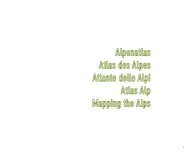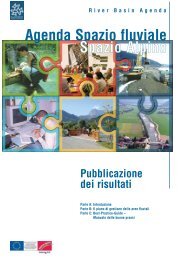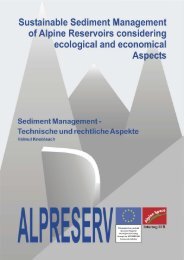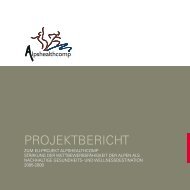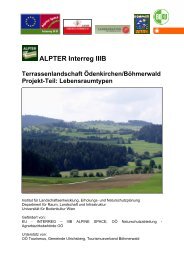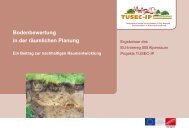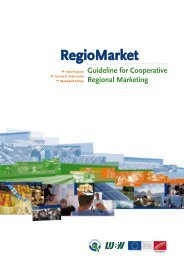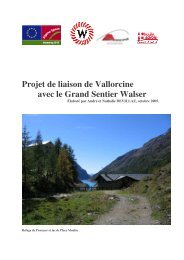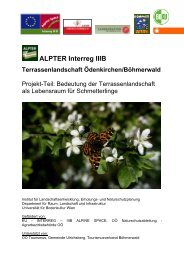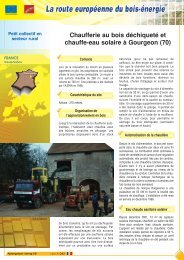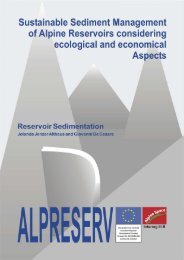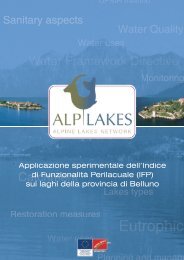1.2 - INTERREG IIIB Alpine Space Programme
1.2 - INTERREG IIIB Alpine Space Programme
1.2 - INTERREG IIIB Alpine Space Programme
Create successful ePaper yourself
Turn your PDF publications into a flip-book with our unique Google optimized e-Paper software.
56 3.1 ALPRESERV<br />
environment and cultural heritage<br />
Lead partner<br />
Universität der<br />
Bundeswehr München<br />
Other partners<br />
Land Steiermark<br />
Provincia A. di Bolzano<br />
St MUGV<br />
TU Graz<br />
ÖVÖU<br />
Verbund - AHP AG<br />
CESI Ricerca S.p.A<br />
Provincia di Belluno<br />
Univ. di Trieste<br />
SJE GmbH<br />
Univ. v Ljubljani<br />
EPFL<br />
FMG SA<br />
SFH - Canton du Valais<br />
SWV<br />
Project website<br />
www.alpreserv.org<br />
Contact person<br />
Sven Hartmann<br />
Tel +49 (0)89 6004 2618<br />
Fax +49 (0)89 6004 3858<br />
sven.hartmann@unibw-muenchen.de<br />
alpreserv@gmx.de<br />
Duration<br />
0<strong>1.2</strong>003 – 12.2006<br />
Total budget in EUR<br />
3.050.350<br />
ERDF in EUR<br />
<strong>1.2</strong>82.675<br />
Lead partner<br />
Project partner<br />
D<br />
A<br />
I<br />
D<br />
A<br />
A<br />
A<br />
I<br />
I<br />
I<br />
D<br />
SI<br />
CH<br />
CH<br />
CH<br />
CH<br />
Sustainable Sediment Management of <strong>Alpine</strong> Reservoirs considering<br />
ecological and economical aspects<br />
Sediment management strategies to safeguard storage capacity for flood protection,<br />
water conservation or hydro power use.<br />
Aim<br />
Management of water as an extremely valuable resource is<br />
guaranteed by numerous reservoirs in the <strong>Alpine</strong> environment.<br />
Sediments are transported in rivers originated from<br />
natural geomorphologic processes accumulating material in<br />
reservoirs. Thus, storage capacity is reduced interfering with<br />
the needs of water supply, flood protection and hydro power.<br />
However, the lack of sediments in downstream sections heavily<br />
affects ecological variety, river bed stability and groundwater.<br />
The project aims on a wise management of sediments<br />
on basis of experiences gained on national level to establish<br />
transnational guidelines taking into account the EU Water<br />
Framework Directive and spatial development needs to preserve<br />
existing reservoirs and to avoid uncontrolled exploitation<br />
by constructing new storage capacity.<br />
Activities<br />
The loss of reservoir capacity must be faced either by building<br />
new ones in the fragile environment of the Alps or by enhancing<br />
dams and dikes along rivers and cities occupying valuable<br />
land. To maintain storage volume measures to reduce sedimentation<br />
should be initiated. If sedimentation has already<br />
occurred or may not be prevented methods of excavation<br />
must be taken in consideration such as flushing or mechanical<br />
removal. These are very expensive tasks and may affect<br />
sensitive alpine environment seriously. However, failing to do<br />
so, results in the loss of storage capacity and consequentially<br />
the loss of flood protection abilities, water supply reliability<br />
and hydro power generation potential. As flood protection is a<br />
major task and of high public interest transnational strategies<br />
are needed to implement a sustainable management aiming<br />
on a dynamic balance to avoid reservoir sedimentation as well<br />
as degradation processes of rivers in the peri-alpine belt to<br />
reduce the risk of floods and to avoid severe damages to infrastructure<br />
and private property.<br />
Outcomes and results<br />
In Germany, Austria, Italy and Switzerland intensive work<br />
has been performed to prevent or remediate reservoir sedimentation.<br />
The different experiences will be coordinated for<br />
the <strong>Alpine</strong> <strong>Space</strong> resulting in a comprehensive guideline on<br />
sedimentation processes for enhanced training of water authorities,<br />
local administrations and private businesses. Accompanying<br />
information is necessary to make public aware of<br />
the necessity of sustainable sediment management as part of<br />
flood prevention. Seven typical <strong>Alpine</strong> reservoirs were selected<br />
for pilot projects ranging from a high region facility directly<br />
influenced by glacier activity down to peri-alpine belt river reservoirs<br />
to cover most sedimentation problems in the <strong>Alpine</strong><br />
region. The activities are focussed on different strategies to<br />
transfer or remove sediments in a larger scale taking into consideration<br />
the fragile environment of the Alps. New and innovative<br />
approaches (e.g. density currents) will be tested under<br />
natural conditions based on slight constructional modifications<br />
(e.g. training walls, air bubble sprayers). The measures are<br />
accompanied by extended measurements of biotic and nonbiotic<br />
parameters using experiences from the different nations<br />
and affected authorities. Information of sediment removal efforts<br />
throughout the Alps especially in Italy will add valuable<br />
data. Intensive cross-border knowledge transfer ensures reliable<br />
results and comparability of the effectiveness. A data<br />
base will be implemented to gather information about reservoirs<br />
of different geometry and operational procedures. Based<br />
on the strong collaboration within the partner network data<br />
collection can be extended to monitoring stations, too. Operational<br />
numerical models already in use will provide partners<br />
with simulation results of the pilot projects. Monitoring stations<br />
enable validation of the effectiveness and sustainability of the<br />
measures. Ecological observations (e.g. fish habitats) provide<br />
information about environmental impacts.



